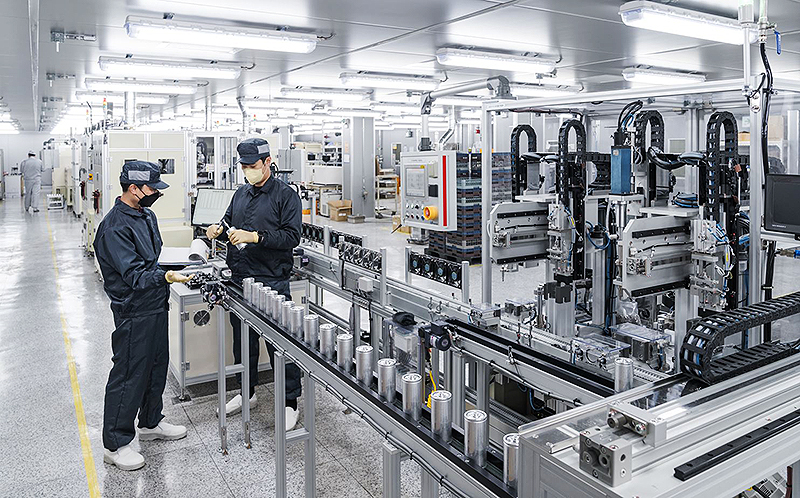- Date
- 2022.11.30
- Hits
- 1967

Photograph) LS Materials employees producing capacitors
■ Plan to develop H-ESS for electric vehicle charging for stable power supply
■ System to prevent thermal runaway fires, long lifespan expected due to reduced rate of deterioration (performance degradation)
■ LS Materials expected to grow in line with expansion of electric vehicle market
LS Cable & System (LS C&S) announced on the 9th that it will participate in a national project to develop a “hybrid energy storage system (H-ESS)
for electric vehicle charging” together with its subsidiary, LS Materials.
The H-ESS will be developed by applying a lithium ion capacitor (LIC) to the lithium ion battery (LIB) of the existing ESS to increase
the stability of power supply and lower the risk of fire.
A capacitor is a special battery for industrial use that is characterized by a high charge and discharge capacity and a long lifespan.
Applications for capacitors are currently expanding to the renewable energy, electric vehicles, and factory automation fields.
LS Materials will supervise the overall project implementation based on its super-capacitor technology, and LS C&S will develop the temperature
monitoring system and charging/discharging control system. The companies plan to produce a prototype in 2023 and complete verification by 2025.
With the instantaneous high-output feature of the LIC, the H-ESS will enable stable electricity supply even during peak periods when multiple
electric vehicles are concurrently charging at a charging station.
In addition, as the control system operates the LIC stably, even when a rapid change occurs in the power supply, the risk of a fire caused by
thermal runaway is reduced. With a low level of performance degradation even with repetitive charging and discharging, the lifespan of a H-ESS is five
to ten times longer than that of an ESS.
Moreover, as the energy efficiency is high, H-ESSs can be established at a smaller scale than ESSs. This can reduce the size of power substation
facilities for charging infrastructure, and lower the costs of establishment.
“Studies of ESS application to electric vehicle charging infrastructure are being actively conducted in Korea and abroad.
However, none of the research outcomes have yet been commercialized,” said LS Materials CEO Yeong-Ho Hong.
“We will dominate the market by preemptively developing an H-ESS.”
LS C&S is accelerating the expansion of its electric vehicle-related business, which includes high-voltage harnesses, traction motor wire,
and ultra-fast charging cables and charging guns. In particular, the company is increasing investments on the expectation once LS Materials’ capacitor is generalized
as an electric vehicle component, the market scale will grow to trillions of won.
- Next
- PCIM Europe 2023

